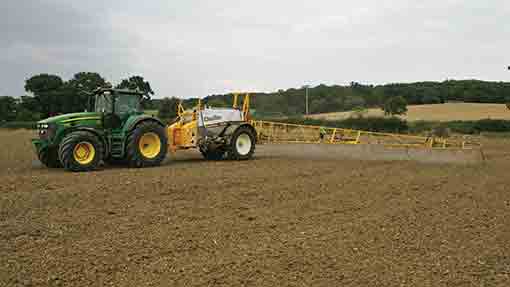Q&A: Get ready for sprayer rule changes

Thousands of farmers and sprayer operators born before 1965 will soon be legally required to hold a certificate of competence to spray agrichemicals.
With 15 months until the changes to the sprayer operator regulations come into force, the Health and Safety Executive (HSE) has issued new guidance on the rule changes.
See also: Matt Redman wins top sprayer operator accolade
Growers who fit into this category and are not exempt from the rule changes are being advised to seek appropriate training now to avoid falling foul of the new legislation.
Here are 10 Q&As to help explain the rule changes:
1. Do I need a licence to spray pesticides?
Up to 26 November 2015, those who were born on or before 31 December 1964 and use a professional product on their own or their employer’s land are exempt from the requirement to hold a Specified Certificate.
However, after 26 November 2015 everyone who uses a professional product must have a Specified Certificate (previously called a Certificate of Competence).
2. What is the grandfather rights exemption for spraying pesticides without a certificate of competence?
Under the previous UK legislation governing pesticide use, anyone who was born on or before 31 December 1964 who used plant protection products authorised for professional use on their own or their employer’s land (they were not engaged in providing a commercial service) were exempt from the requirement to hold a Certificate of Competence (commonly known as a spraying licence or a training certificate in the use of pesticides). They were still obliged to be suitably trained and competent for their job. This exemption is commonly known as grandfather rights.
3. Why are grandfather rights being phased out?
The Plant Protection Products (Sustainable Use) Regulations 2012 state that everyone who uses a plant protection product authorised for professional use must have a Specified Certificate.
4. What is a Specified Certificate?
A Specified Certificate used to be called a Certificate of Competence.
The HSE has published a list of Specified Certificates , which includes Certificates of Competence issued before 26 November 2013, any other certificates issued before 26 November 2013 which it recognises as valid, and all accredited certificates issued after 26 November 2013.
5. I have relied on grandfather rights, how do I get a Specified Certificate?
Specific training/certification arrangements have been made for those who have relied on grandfather rights. City and Guilds Land Based Services have developed a new Level 2 Award in the Safe Use of Pesticides, replacing grandfather rights.
Alternatively, you can obtain one of the existing Level 2 Safe Use of Pesticide awards appropriate to the work and type of equipment you use. You must take this route if you intend to work as a contractor or apply plant protection products to land you or your employer do not own.
6. What is the new Level 2 Award in the Safe Use of Pesticides replacing grandfather rights?
The new qualification will take account of the fact that people working under grandfather rights should already have some form of training and may have many years experience in working with pesticides. In recognition of this, the qualification has been developed so as to take significantly less time, and cost less, than the existing Level 2 qualifications for pesticide users.
The training will be based on a workbook, setting out the required knowledge, which can be studied at the candidate’s convenience. This will be followed up with a practical assessment of competence. As with all Level 2 pesticide awards, the training modules will be based on the type of equipment to be used. The assessment should generally be possible at the candidate’s premises, an assessment centre or at an alternative suitable venue.
7. Where do I get further information on the Level 2 Award in the Safe Use of Pesticides, replacing grandfather rights?
Full details are available on the City & Guilds Land Based Services website .
8. Who runs training courses for certificates of competence?
Specified Certificates for using pesticides are issued by City & Guilds Land Based Services (previously known as the NPTC or National Proficiency Tests Council). They can tell you who provides training in your area. Visit the City & Guilds Land Based Services website or telephone them on 02476 857 300.
Alternatively you could contact your local agricultural college.
9. I want to carry out aerial spraying. What do I need to do?
Aerial spraying is prohibited unless the operator holds a permit issued by the Chemicals Regulation Directorate (CRD) for spray operations carried out in accordance with an approved application plan. Those applying pesticides from an aircraft or those responsible for such operations are required to follow the requirements set out in Regulations 15 and 16 and Schedule 2 of the Plant Protection Products (Sustainable Use) Regulations 2012. Detailed information is available on the Aerial Spraying Permit Arrangements page of the pesticides website. You must also inform the Environment Agency and Natural England of such spray operations.
10. Do I need the landowner’s permission to use a pesticide on their land?
Yes. It is important that you obtain the permission of the landowner as under the law relating to pesticides they may be deemed liable to “cause or permit” someone to use a pesticide product on land that they own. The landowner is also likely to have health and safety duties for those who use the land where they have control over it.

